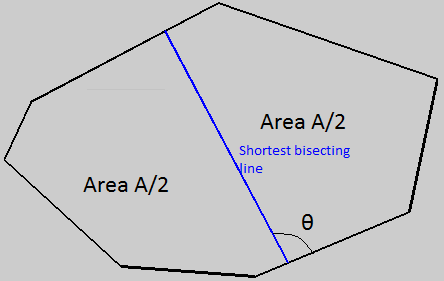Let $C$ be a convex polygon in the plane and let $s$ be the shortest line segment (I believe this is called a "chord") that divides the area of $C$ in half. What is the smallest angle that $s$ could make where it touches the boundary of $C$? This picture shows an example, I I called the angle $\theta$ (and the area of the region is $A$):
(I don't have enough reputation to post images)
Numerical simulations suggest that $\theta\geq\pi/3$ but I haven't been able to prove this.
